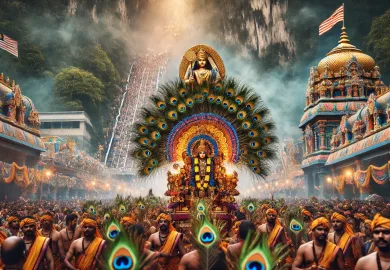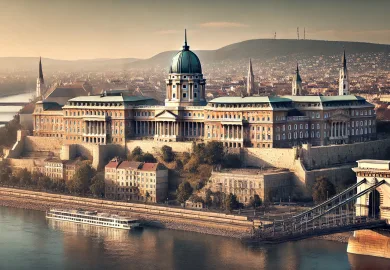
Disclaimer: This content was generated using AI. While I strive for accuracy, I encourage readers to verify important information. I use AI-generated content to increase efficiencies and to provide certain insights, but it may not reflect human expertise or opinions.
Firewalking, a breathtaking display of faith, endurance, and cultural pride, finds its roots deep in the traditions of various cultures around the world. Two of the most remarkable locations where this ancient practice continues to thrive are Fiji and Mauritius. Both islands, steeped in rich history and diverse cultural influences, offer a unique perspective on this sacred ritual. In this article, we will explore the fascinating world of firewalking in these two paradisiacal destinations, diving into the origins, practices, and significance of this awe-inspiring tradition.
The Origins of Firewalking in Fiji and Mauritius
The tradition of firewalking has a long and storied history in both Fiji and Mauritius, each with its own unique origin story and cultural context.
In Fiji, the firewalking ritual is closely associated with the Sawau tribe from the island of Beqa, located off the southern coast of Viti Levu. According to Fijian legend, the practice began over 500 years ago when a young warrior named Tunaiviqalita was bestowed the power to walk on fire by a spirit god after a remarkable encounter. The firewalking ceremony, or “Vilavilairevo,” has since become a symbol of spiritual strength and cultural identity for the Fijian people.
Mauritius, on the other hand, has a firewalking tradition deeply rooted in the Hindu community. The practice is linked to the Tamil festival of Thaipusam Cavadee, a religious observance that honors Lord Murugan, the Hindu god of war. Brought to Mauritius by Tamil indentured laborers during the colonial period, firewalking has become an integral part of the island’s cultural landscape. The firewalkers, known as “Cavadee devotees,” undertake this ritual as an act of devotion, penance, and spiritual cleansing.
Both of these traditions highlight the power of faith and the deep connection between the physical and spiritual realms in their respective cultures.
The Ritual of Firewalking: Preparation and Ceremony
The preparation for firewalking is as significant as the act itself, involving a series of rituals that purify the mind and body of the participants.
In Fiji, the firewalking ceremony is often held in conjunction with important community events, such as weddings or celebrations of significant achievements. The participants, who are traditionally men, undergo a period of fasting and spiritual cleansing before the ceremony. They also engage in prayers and offerings to the gods, seeking protection and blessings. The fire pit is prepared by burning logs until they turn into a bed of hot embers, which can reach temperatures of up to 1,000 degrees Celsius. The firewalkers, guided by the chanting of the community, step onto the embers, walking across them barefoot without suffering burns or injury—a phenomenon believed to be possible only through divine protection.
In Mauritius, the firewalking ritual is part of a broader religious festival. The preparation involves strict fasting, abstinence, and prayer, often lasting for ten days leading up to the event. Devotees carry the Cavadee, a wooden arch decorated with flowers and peacock feathers, on their shoulders as they make their way to the temple. The firewalking itself is the culmination of this pilgrimage, symbolizing the purification of the soul. Like in Fiji, the participants in Mauritius believe that their faith and devotion will protect them from harm as they walk across the fiery embers.
These ceremonies are not just tests of physical endurance but also profound spiritual experiences that connect the participants to their ancestors and gods.
Cultural Significance and Symbolism of Firewalking
Firewalking is not merely a physical act; it is laden with cultural and spiritual symbolism that resonates deeply within the communities of Fiji and Mauritius.
In Fiji, firewalking serves as a powerful symbol of the Sawau tribe’s unique identity and their connection to the land and their ancestors. The ritual reinforces the tribe’s social cohesion and continuity, as it is often passed down from generation to generation. The act of walking on fire without being burned is seen as a testament to the spiritual power and purity of the participants. It is also believed to bring blessings and protection to the community, ensuring prosperity and harmony.
In Mauritius, firewalking is a manifestation of the devotees’ unwavering faith in Lord Murugan. The ritual is seen as a form of penance, where the physical pain of walking on fire is offered as a sacrifice to atone for sins and seek divine blessings. It is also a way to demonstrate the strength of their devotion, with the fire symbolizing the purification of the soul from worldly impurities. The event is not only a religious experience but also a communal one, bringing together the Tamil community in a shared expression of their cultural heritage.
In both cultures, firewalking transcends the boundaries of the physical world, serving as a bridge between the human and the divine, the past and the present.
The Modern-Day Practice of Firewalking
Despite the encroachment of modernity, the practice of firewalking continues to thrive in both Fiji and Mauritius, albeit with some adaptations to the changing times.
In Fiji, firewalking remains a significant cultural event, attracting not only locals but also tourists who are fascinated by this ancient ritual. The ceremony is often included in cultural tours, where visitors can witness the firewalking and learn about its history and significance. While the spiritual essence of the ritual remains intact, the commercial aspect has introduced some changes, such as the inclusion of safety measures and the performance of firewalking outside traditional contexts. Nonetheless, the core values of faith, community, and cultural pride continue to be upheld.
In Mauritius, firewalking is still an essential part of the Thaipusam Cavadee festival, celebrated with great fervor by the Tamil community. The festival has grown in scale, with thousands of devotees participating in the firewalking ritual each year. The event is also a major attraction for tourists, who are drawn to its vibrant atmosphere and the spectacle of devotees walking across the fiery embers. While the ritual’s religious significance remains paramount, the increased visibility has brought the tradition into the public eye, ensuring its continuity for future generations.
Both in Fiji and Mauritius, firewalking has managed to maintain its relevance in the modern world, serving as a powerful reminder of the enduring strength of cultural traditions and the human spirit.
Firewalking in Fiji and Mauritius is a testament to the resilience of ancient traditions in the face of modern challenges. Rooted in deep spiritual beliefs and cultural identities, these ceremonies offer a unique insight into the rich tapestry of human culture. Whether viewed as a religious act, a cultural ritual, or a fascinating spectacle, firewalking continues to captivate and inspire, embodying the enduring connection between the physical and spiritual realms.








